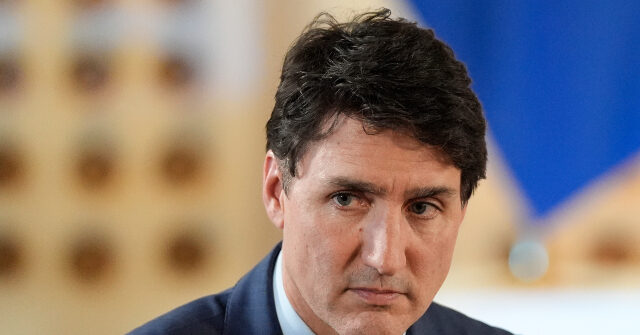The Conservative Party of Canada demanded on Tuesday that Prime Minister Justin Trudeau reopen Parliament for an emergency session to address the impending threat of American tariffs under President Donald Trump.
Conservative leader Pierre Poilievre called Trump’s threat to impose tariffs as high as 25 percent on Canadian goods an “emergency” and derided the ruling Liberal Party for proroguing – essentially paralyzing – Parliament through late March, when the Party’s election for a successor to Trudeau will conclude.
Trudeau announced in early January that he would resign from the prime ministership and leadership of the Liberal Party following months of catastrophic poll numbers for his party against the Conservatives, the result of crippling housing, healthcare, and immigration crises during his decade-long term.
Trudeau did not acknowledge any of the failures of his administration in his resignation announcement, instead claiming that he was the victim of internal Liberal Party squabbles that were eroding the popularity of the party.
RELATED: Lawmakers Burst out Laughing at Justin Trudeau Saying “Responsible Leadership”
The final controversy for Trudeau before his announcement was the sudden resignation of deputy prime minister and longtime political ally Chrystia Freeland in December, who framed her resignation as part of a larger disagreement with Trudeau on how to handle Trump. Trudeau faced criticism and heckling for responding to Trump’s initial threat to impose a 25-percent tariff by making a swift trip to Trump’s estate, Mar-a-Lago, and offering kind words to the then-president-elect.
Trump joined in the jesting at Trudeau’s expense, referring to him as the “governor” of the “state” of Canada, which he threatened to annex.
On the first day of his second term in office, Trump confirmed he was planning on imposing a 25-percent tariff on goods from both Canada and Mexico in response to what he described as those countries’ failures to curb illegal immigration and drug trafficking. Trump told reporters on Tuesday he was planning on imposing the tariffs on February 1.
As a result of Trudeau’s resignation from the leadership of the Liberal Party, the Canadian Parliament will not be in session until March 24, leaving it incapacitated to respond to the tariff threat by the February 1 deadline.
In a statement published on Tuesday, Poilievre demanded Parliament return for an emergency session on the proposed tariffs as soon as possible.
Referring to Trump’s tariffs as “unjustified,” Poilievre nonetheless denounced the “weak border” Trudeau was leaving after his time as prime minister and insisted that Parliament must act to fix the problem Trump identified.
“Our American counterparts say they want to stop the illegal flow of drugs and other criminal activity at our border,” Poilievre wrote. “The Liberal government admits their weak border is a problem.”
“That is why they announced a multibillion-dollar border plan – a plan they cannot fund because they shut down Parliament, preventing MPs and Senators from authorizing the funds,” he observed, adding that Canada must also plan for “retaliatory tariffs” against America in the event that the February 1 deadline passes without resolution.
“Canada has never been so weak and things have never been so out of control,” Poilievre lamented.
Canadians appear to largely agree with the necessity of holding an election to secure a new prime minister as soon as possible. A poll published on Tuesday by the firm Ipsos found that 77 percent of respondents agree that Canada needs “a federal election immediately so we have a Prime Minister and government with a strong mandate to deal with the tariff threat from President Trump.”
CBC News’ average of polls taken between January 13 and January 20 finds that Poilievre’s conservatives would win nearly 45 percent of the vote if an election were held immediately, over double the 21.9 percent who support the Liberals and 17.6 percent who support the far-left New Democratic Party (NDP). While split between two major parties, the left-wing vote of the Liberals and NDP combined would still total less than the support for the Conservatives.
Trudeau and his administration have proposed imposing retaliatory tariffs on the United States, but not offered any clarity on how those policies are possible to implement fully without a functional Parliament. Trudeau on Tuesday condemned Trump for the tariff proposing, claiming it to be at odds with his Inauguration Day promise of heralding a “golden age” for America.
“President Trump said that he wants to usher in a golden age for the United States that will require more steel and aluminum, more critical minerals, more reliable and affordable energy, more of everything to run the U.S. economy full steam ahead,” Trudeau told reporters.
“Canada has all those resources, and we stand at the ready to work with the United States to create a booming and secure North American economy,” he added, but later warned, “Everything is on the table, and I support the principle of dollar-for-dollar matching tariffs.”
Trudeau did not clarify how Canada would impose those tariffs without parliamentary action.
Similarly, Freeland, seeking to succeed Trudeau, threatened to “hit back” at any imposed tariffs in a Washington Post op-ed published this weekend.
“The threats won’t work. We will not escalate, but we will not back down. If you hit us, we will hit back,” she promised, “and our blows will be precisely targeted. We are smaller than you, to be sure, but the stakes for us are immeasurably higher. Do not doubt our resolve.”
Freeland did not address in the column what effect not having a functional legislative body would have on Canada’s ability to “hit back.”
Follow Frances Martel on Facebook and Twitter.
Read the full article here
